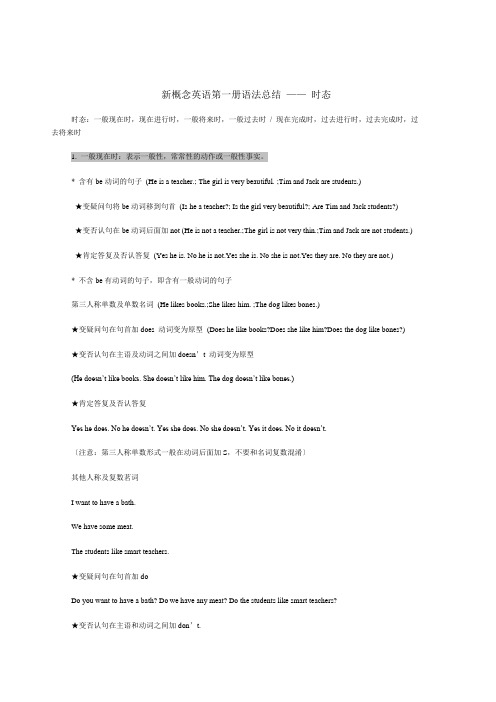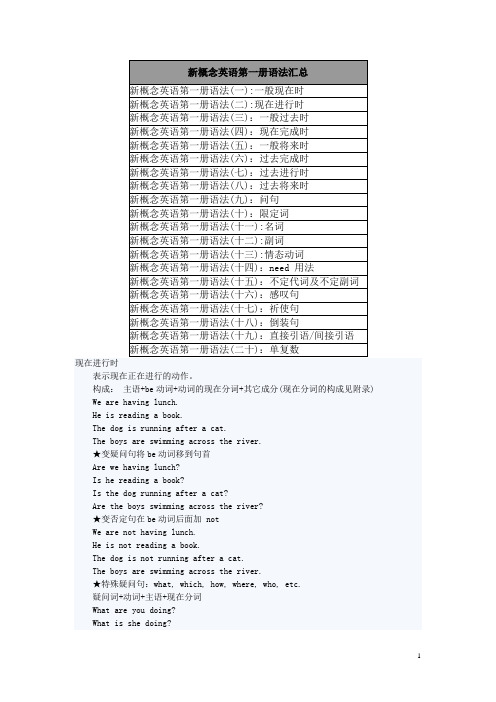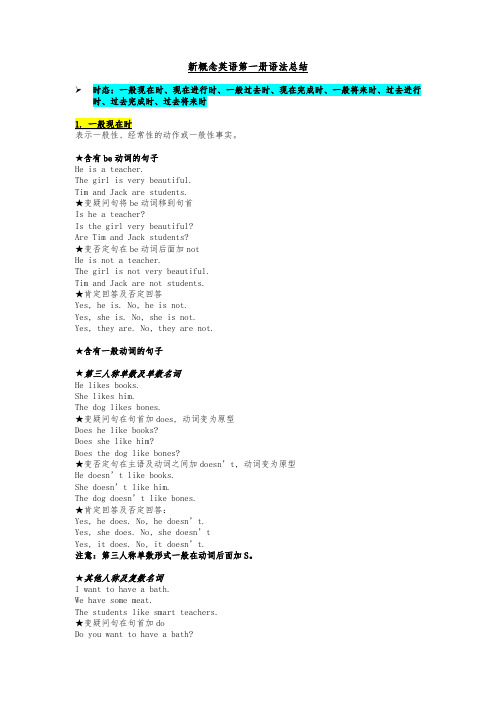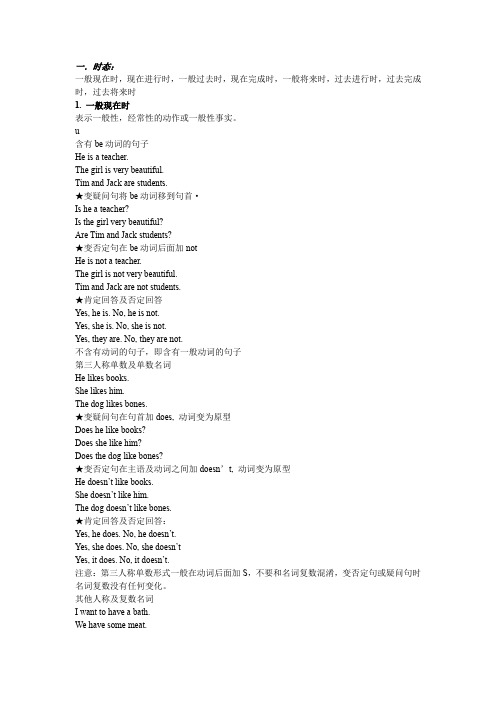新概念英语第一册语法复习:现在进行时
新概念第一册时态总结

新概念英语第一册语法总结——时态时态:一般现在时,现在进行时,一般将来时,一般过去时/ 现在完成时,过去进行时,过去完成时,过去将来时1. 一般现在时:表示一般性,常常性的动作或一般性事实。
* 含有be动词的句子(He is a teacher.; The girl is very beautiful. ;Tim and Jack are students.)★变疑问句将be动词移到句首(Is he a teacher?; Is the girl very beautiful?; Are Tim and Jack students?)★变否认句在be动词后面加not (He is not a teacher.;The girl is not very thin.;Tim and Jack are not students.)★肯定答复及否认答复(Yes he is. No he is not.Yes she is. No she is not.Yes they are. No they are not.)* 不含be有动词的句子,即含有一般动词的句子第三人称单数及单数名词(He likes books.;She likes him. ;The dog likes bones.)★变疑问句在句首加does 动词变为原型(Does he like books?Does she like him?Does the dog like bones?)★变否认句在主语及动词之间加doesn’t 动词变为原型(He doesn’t like books. She doesn’t like him. The dog doesn’t like bones.)★肯定答复及否认答复Yes he does. No he doesn’t. Yes she does. No she doesn’t. Yes it does. No it doesn’t.〔注意:第三人称单数形式一般在动词后面加S,不要和名词复数混淆〕其他人称及复数茗词I want to have a bath.We have some meat.The students like smart teachers.★变疑问句在句首加doDo you want to have a bath? Do we have any meat? Do the students like smart teachers?★变否认句在主语和动词之间加don’t.You don’t want to have a bath. We don’t have any meat. The students don’t like smart teachers.★肯定答复及否认答复Yes I do. No I don’t. Yes we do. No we don’t. Yes they do. No they don’t.2. 现在进行时,表示现在正在进行的动作。
新概念英语第一册语法汇总

What is the dog doing?没有进行时的动词(必背)表示状态,思想,感情和感觉的动词不能表示正在进行的动作1. 表示感觉,感官的词see, hear, like, love, want,2. have, has当”拥有”讲时没有进行时一、时态:一般现在时,现在进行时,一般过去时,现在完成时,一般将来时,过去进行时,过去完成时,过去将来时1. 一般现在时表示一般性,经常性的动作或一般性事实。
1 含有be动词的句子He is a teacher.The girl is very beautiful.Tim and Jack are students.★变疑问句将be动词移到句首Is he a teacher?Is the girl very beautiful?Are Tim and Jack students?★变否定句在be动词后面加notHe is not a teacher.The girl is not very beautiful.Tim and Jack are not students.★肯定回答及否定回答Yes, he is. No, he is not.Yes, she is. No, she is not.Yes, they are. No, they are not.★不含有be动词的句子,即含有一般动词的句子第三人称单数及单数名词He likes books.She likes him.The dog likes bones.★变疑问句在句首加does, 动词变为原型Does he like books?Does she like him?Does the dog like bones?★变否定句在主语及动词之间加doesn’t, 动词变为原型,原句中的动词不再有第三人称变化。
He doesn’t like books.She doesn’t like him.The dog doesn’t like bones.★肯定回答及否定回答:Yes, he does. No, he doesn’t.Yes, she does. No, she doesn’tYes, it does. No, it doesn’t.注意:第三人称单数形式一般在动词后面加S,不要和名词复数混淆,变否定句或疑问句时名词复数没有任何变化。
新概念英语第一册语法知识点汇总

新概念英语第一册语法总结➢时态:一般现在时、现在进行时、一般过去时、现在完成时、一般将来时、过去进行时、过去完成时、过去将来时★含有be动词的句子He is a teacher.The girl is very beautiful.Tim and Jack are students.★变疑问句将be动词移到句首Is he a teacher?Is the girl very beautiful?Are Tim and Jack students?★变否定句在be动词后面加notHe is not a teacher.The girl is not very beautiful.Tim and Jack are not students.★肯定回答及否定回答Yes, he is. No, he is not.Yes, she is. No, she is not.Yes, they are. No, they are not.★含有一般动词的句子★第三人称单数及单数名词He likes books.She likes him.The dog likes bones.★变疑问句在句首加does, 动词变为原型Does he like books?Does she like him?Does the dog like bones?★变否定句在主语及动词之间加doesn’t, 动词变为原型He doesn’t like books.She doesn’t like him.The dog doesn’t like bones.★肯定回答及否定回答:Yes, he does. No, he doesn’t.Yes, she does. No, she doesn’tYes, it does. No, it doesn’t.注意:第三人称单数形式一般在动词后面加S。
★其他人称及复数名词I want to have a bath.We have some meat.The students like smart teachers.★变疑问句在句首加doDo you want to have a bath?Do we have any meat?Do the students like smart teachers?★变否定句在主语和动词之间加don’t.You don’t want to have a bath.We don’t have any meat.The students don’t like smart teachers.★肯定回答及否定回答Yes, I do. No, I don’t.Yes, we do. No, we don’tYes, they do. No, they don’t.构成:主语+be动词+动词的现在分词+其它成分We are having lunch.He is reading a book.The dog is running after a cat.The boys are swimming across the river.★变疑问句将be动词移到句首Are we having lunch?Is he reading a book?Is the dog running after a cat?Are the boys swimming across the river?★变否定句在be动词后面加notWe are not having lunch.He is not reading a book.The dog is not running after a cat.The boys are swimming across the river.★特殊疑问句:what, which, how, where, who, etc.疑问词+be动词+主语+现在分词What are you doing?What is she doing?What is the dog doing?没有进行时的动词(必背)表示状态、思想、感情、感觉的动词不能表示正在进行的动作1. 表示感觉、感官的词see, hear, like, love, want2. have, has作为动词”拥有”的含义时,没有进行时常和表示过去的时间状语连用,如yesterday, last night, the day before yesterday, three days ago.含有be动词的句子,将动词变为过去式,am / is的变为was,are的变为wereI was at the butcher’s.You were a student a year ago.The teacher was very beautiful ten years ago.★变疑问句将be动词移动到句首Were you at the butcher’s?Were you a student a year ago?Was the teacher very beautiful ten years ago?★变否定句在be动词后面加notI was not at the butcher’s.You were not a student a year ago.The teacher was not very beautiful ten years ago.★肯定回答否定回答Yes, I was. No, I was not.Yes, you were. No, you were not.Yes, he/she was. No, he/she was not.★特殊疑问句:What did you do?不含有be动词的句子,将动词变为过去式,动词过去式构成见附录I finished my homework yesterday.The boy went to a restaurant.The Sawyers lived at King Streeta year ago.King Streeta year ago.★变疑问句在句首加did,动词变为原型Did you finish your homework yesterday?Did the boy go to a restaurant?Did the Sawyers live at King Streeta year ago?King Streeta year ago?★变否定句在主语和动词之间加did not,动词变为原型I did not finish my homework yesterday.The boy did not go to a restaurant.The Sawyers did not live at King Streeta year ago.King Streeta year ago.★肯定回答及否定回答Yes, I did. No, I didn’t.Yes, he did. No, he didn’t.Yes, they did. No, they did not.have/has+过去分词用法:1)表示过去发生且和现在有某种联系的动作,常和just, usually, already, since等时间副词连用I have just had lunch. (饱了,不用再吃了)He has had a cup of tea.(不渴了,不用再喝)They have already had their holiday. (不能再度假了)The boy has already read the book. (已经知道书的容了,不用再看了)2)询问别人是否做过某事一般用现在完成时Have you finished your homework?Have you been to Beijing?Have he seen the film?3)表示开始于过去并持续到现在的动作I have lived in Beijing for twenty years.I have worked for this school for 1 year.4)表示一种经历、经验:去过…地方,做过…事情,经历过…事情I have never had a bath.I have never seen a film.I have never been to cinema.I have ever been to Paris.Have been to表示去过,have gone to 表示去了I have been to London.(人已经回来)He has gone to London.(人还在那里)5)表示一种结果,一般不和时间副词联用I have lost my pen.I have hurt myself.He has become a teacher.She has broken my heart.句型变化:★变疑问句将助动词移到句首,变否定句在助动词后面加not.Have you lost your pen? I have not lost my pen.★肯定回答及否定回答Yes, I have. No, I have not.★特殊疑问句:What have you done?What has he done?一般过去时与现在完成时的区别:凡是有明确的表示过去的时间状语的句子为过去时注意:有些动词表示的动作有一个终点,不能再延续,因此不能和表示一段时间状语连用错:I’ve left Beijing for 3 days.对:I left Beijing 3 days ago. I have been away from being for 3 days.经常和tomorrow, next year, the day after tomorrow, the year after the next, in five hours’ time, etc. 表示将来的词联用结构:主语+助动词will+动词原形I will go to America tomorrow.The pilot will fly to Japan the month after the next.Jack will move into his new house tomorrow morning.★变疑问句将助动词移到句首Will you go to America tomorrow?Will the pilot fly to Japan the month after the next?Will Jack move into his new house tomorrow morning?★变否定句在助动词后面加notI will not go to America tomorrow.The pilot will not fly to Japan the month after the next.Jack will not move into his new house tomorrow morning★肯定回答及否定回答Yes, I will. No, I will not.Yes, he/she will. No, he/she will not.Yes, he will. No, he will not.★特殊疑问句:What will you do?结构:had+过去分词After she had finished her homework, she went shopping.They had sold the car before I asked the price.The train had left before I arrived at the station.After/before引导的时间状语从句放在句首要在句子后面加逗号,如果放在主句后则不用。
新概念英语第一册课文原文中的重要语法点总结

新概念英语第一册课文原文中的重要语法点总结是英语初学者首选的入门教材,它通过各种实用的对话和文章,帮助大家掌握最基础的英语进阶。
本文主要为您总结其中的重要语法点。
1、现在进行时:这是第一册中出现频率较高的时态之一,常用于描述正在进行的动作。
句子结构通常为“主语+is/are+动词-ing”。
例如:“I am reading a book、” (我正在读书。
)2、现在时:英语第一册也经常使用现在时来表述事物的状态或常规动作。
普通现在时的句子结构为“主语+动词原形”。
例如:“I live in Beijing、” (我住在北京。
)3、一般过去时:该时态常用来描述过去发生的事情或状态。
句子结构为“主语+动词的过去式”。
例如:“I arriv ed home late last night、”(我昨晚回家很晚。
)4、不定冠词和定冠词的使用:中“a/an”和“the”的使用频繁。
不定冠词主要用于泛指,定冠词用于特指。
例如:“This is a book、”(这是一本书)中的"a book"就是泛指,而在“This is the book that I bought yesterday、”(这是我昨天买的那本书)中的"the book"则是特指。
5、基本疑问句和回答:如何提出问题和如何回答问题,是第一册中非常重要的一部分。
其中包括用于提问的疑问词what, where, when, who, why的运用,以及用于回答的肯定回答和否定回答的构造方式。
6、代词的使用:新概念英语第一册会讲解个人代词,物主代词和反身代词的用法,并通过大量例句进行实战演练。
例如:“He is my friend、 I like him very much、"(他是我的朋友,我非常喜欢他。
)总结起来,新概念英语第一册主要围绕以上几个基础语法点进行教学,帮助大家在实际运用中快速掌握这些语法知识。
《新概念英语》第一册语法总结

一.时态:一般现在时,现在进行时,一般过去时,现在完成时,一般将来时,过去进行时,过去完成时,过去将来时1. 一般现在时表示一般性,经常性的动作或一般性事实。
u含有be动词的句子He is a teacher.The girl is very beautiful.Tim and Jack are students.★变疑问句将be动词移到句首·Is he a teacher?Is the girl very beautiful?Are Tim and Jack students?★变否定句在be动词后面加notHe is not a teacher.The girl is not very beautiful.Tim and Jack are not students.★肯定回答及否定回答Yes, he is. No, he is not.Yes, she is. No, she is not.Yes, they are. No, they are not.不含有动词的句子,即含有一般动词的句子第三人称单数及单数名词He likes books.She likes him.The dog likes bones.★变疑问句在句首加does, 动词变为原型Does he like books?Does she like him?Does the dog like bones?★变否定句在主语及动词之间加doesn’t, 动词变为原型He doesn’t like books.She doesn’t like him.The dog doesn’t like bones.★肯定回答及否定回答:Yes, he does. No, he doesn’t.Yes, she does. No, she doesn’tYes, it does. No, it doesn’t.注意:第三人称单数形式一般在动词后面加S,不要和名词复数混淆,变否定句或疑问句时名词复数没有任何变化。
新概念英语第一册语法知识点讲解

新概念英语第一册语法总结➢时态:一般现在时、现在进行时、一般过去时、现在完成时、一般将来时、过去进行时、过去完成时、过去将来时★含有be动词的句子He is a teacher.The girl is very beautiful.Tim and Jack are students.★变疑问句将be动词移到句首Is he a teacher?Is the girl very beautiful?Are Tim and Jack students?★变否定句在be动词后面加notHe is not a teacher.The girl is not very beautiful.Tim and Jack are not students.★肯定回答及否定回答Yes, he is. No, he is not.Yes, she is. No, she is not.Yes, they are. No, they are not.★含有一般动词的句子★第三人称单数及单数名词He likes books.She likes him.The dog likes bones.★变疑问句在句首加does, 动词变为原型Does he like books?Does she like him?Does the dog like bones?★变否定句在主语及动词之间加doesn’t, 动词变为原型He doesn’t like books.She doesn’t like him.The dog doesn’t like bones.★肯定回答及否定回答:Yes, he does. No, he doesn’t.Yes, she does. No, she doesn’tYes, it does. No, it doesn’t.注意:第三人称单数形式一般在动词后面加S。
★其他人称及复数名词I want to have a bath.We have some meat.The students like smart teachers.★变疑问句在句首加doDo you want to have a bath?Do we have any meat?Do the students like smart teachers?★变否定句在主语和动词之间加don’t.You don’t want to have a bath.We don’t have any meat.The students don’t like smart teachers.★肯定回答及否定回答Yes, I do. No, I don’t.Yes, we do. No, we don’tYes, they do. No, they don’t.构成:主语+be动词+动词的现在分词+其它成分We are having lunch.He is reading a book.The dog is running after a cat.The boys are swimming across the river.★变疑问句将be动词移到句首Are we having lunch?Is he reading a book?Is the dog running after a cat?Are the boys swimming across the river?★变否定句在be动词后面加notWe are not having lunch.He is not reading a book.The dog is not running after a cat.The boys are swimming across the river.★特殊疑问句:what, which, how, where, who, etc.疑问词+be动词+主语+现在分词What are you doing?What is she doing?What is the dog doing?没有进行时的动词(必背)表示状态、思想、感情、感觉的动词不能表示正在进行的动作1. 表示感觉、感官的词see, hear, like, love, want2. have, has作为动词”拥有”的含义时,没有进行时常和表示过去的时间状语连用,如yesterday, last night, the day before yesterday, three days ago.含有be动词的句子,将动词变为过去式,am / is的变为was,are的变为wereI was at the butcher’s.You were a student a year ago.The teacher was very beautiful ten years ago.★变疑问句将be动词移动到句首Were you at the butcher’s?Were you a student a year ago?Was the teacher very beautiful ten years ago?★变否定句在be动词后面加notI was not at the butcher’s.You were not a student a year ago.The teacher was not very beautiful ten years ago.★肯定回答否定回答Yes, I was. No, I was not.Yes, you were. No, you were not.Yes, he/she was. No, he/she was not.★特殊疑问句:What did you do?不含有be动词的句子,将动词变为过去式,动词过去式构成见附录I finished my homework yesterday.The boy went to a restaurant.The Sawyers lived at King Streeta year ago.King Streeta year ago.★变疑问句在句首加did,动词变为原型Did you finish your homework yesterday?Did the boy go to a restaurant?Did the Sawyers live at King Streeta year ago?King Streeta year ago?★变否定句在主语和动词之间加did not,动词变为原型I did not finish my homework yesterday.The boy did not go to a restaurant.The Sawyers did not live at King Streeta year ago.King Streeta year ago.★肯定回答及否定回答Yes, I did. No, I didn’t.Yes, he did. No, he didn’t.Yes, they did. No, they did not.have/has+过去分词用法:1)表示过去发生且和现在有某种联系的动作,常和just, usually, already, since等时间副词连用I have just had lunch. (饱了,不用再吃了)He has had a cup of tea.(不渴了,不用再喝)They have already had their holiday. (不能再度假了)The boy has already read the book. (已经知道书的内容了,不用再看了)2)询问别人是否做过某事一般用现在完成时Have you finished your homework?Have you been to Beijing?Have he seen the film?3)表示开始于过去并持续到现在的动作I have lived in Beijing for twenty years.I have worked for this school for 1 year.4)表示一种经历、经验:去过…地方,做过…事情,经历过…事情I have never had a bath.I have never seen a film.I have never been to cinema.I have ever been to Paris.Have been to表示去过,have gone to 表示去了I have been to London.(人已经回来)He has gone to London.(人还在那里)5)表示一种结果,一般不和时间副词联用I have lost my pen.I have hurt myself.He has become a teacher.She has broken my heart.句型变化:★变疑问句将助动词移到句首,变否定句在助动词后面加not.Have you lost your pen? I have not lost my pen.★肯定回答及否定回答Yes, I have. No, I have not.★特殊疑问句:What have you done?What has he done?一般过去时与现在完成时的区别:凡是有明确的表示过去的时间状语的句子为过去时注意:有些动词表示的动作有一个终点,不能再延续,因此不能和表示一段时间状语连用错:I’ve left Beijing for 3 days.对:I left Beijing 3 days ago. I have been away from being for 3 days.经常和tomorrow, next year, the day after tomorrow, the year after the next, in five hours’ time, etc. 表示将来的词联用结构:主语+助动词will+动词原形I will go to America tomorrow.The pilot will fly to Japan the month after the next.Jack will move into his new house tomorrow morning.★变疑问句将助动词移到句首Will you go to America tomorrow?Will the pilot fly to Japan the month after the next?Will Jack move into his new house tomorrow morning?★变否定句在助动词后面加notI will not go to America tomorrow.The pilot will not fly to Japan the month after the next.Jack will not move into his new house tomorrow morning★肯定回答及否定回答Yes, I will. No, I will not.Yes, he/she will. No, he/she will not.Yes, he will. No, he will not.★特殊疑问句:What will you do?结构:had+过去分词After she had finished her homework, she went shopping.They had sold the car before I asked the price.The train had left before I arrived at the station.After/before引导的时间状语从句放在句首要在句子后面加逗号,如果放在主句后则不用。
新概念第一册时态总结
新概念英语第一册语法总结——时态时态:一般现在时,现在进行时,一般将来时,一般过去时/ 现在完成时,过去进行时,过去完成时,过去将来时1. 一般现在时:表示一般性,常常性的动作或一般性事实。
* 含有be动词的句子(He is a teacher.; The girl is very beautiful. ;Tim and Jack are students.)★变疑问句将be动词移到句首(Is he a teacher?; Is the girl very beautiful?; Are Tim and Jack students?)★变否定句在be动词后面加not (He is not a teacher.;The girl is not very thin.;Tim and Jack are not students.)★肯定回答及否定回答(Yes he is. No he is not.Yes she is. No she is not.Yes they are. No they are not.)* 不含be有动词的句子,即含有一般动词的句子第三人称单数及单数名词(He likes books.;She likes him. ;The dog likes bones.)★变疑问句在句首加does 动词变为原型(Does he like books?Does she like him?Does the dog like bones?)★变否定句在主语及动词之间加doesn’t 动词变为原型(He doesn’t like books. She doesn’t like him. The dog doesn’t like bones.)★肯定回答及否定回答Yes he does. No he doesn’t. Yes she does. No she doesn’t. Yes it does. No it doesn’t.(注意:第三人称单数形式一般在动词后面加S,不要和名词复数混淆)其他人称及复数茗词I want to have a bath.We have some meat.The students like smart teachers.★变疑问句在句首加doDo you want to have a bath? Do we have any meat? Do the students like smart teachers?★变否定句在主语和动词之间加don’t.You don’t want to have a bath. We don’t have any meat. The students don’t like smart teachers.★肯定回答及否定回答Yes I do. No I don’t. Yes we do. No we don’t. Yes they do. No they don’t.2. 现在进行时,表示现在正在进行的动作。
新概念英语第一册语法总结(上册)[共八种时态]
新概念英语第一册语法总结(上)[八种时态] 一.时态:一般现在时,现在进行时,一般过去时,现在完成时,一般将来时,过去进行时,过去完成时,过去将来时1.一般现在时:表示一般性,经常性的动作或一般性事实。
含有be动词的句子He is a teacher.The girl is very beautiful.Tim and Jack are students.★变疑问句将be动词移到句首Is he a teacher?Is the girl very beautiful?Are Tim and Jack students?★变否定句在be动词后面加notHe is not a teacher.The girl is not very beautiful.Tim and Jack are not students.★肯定回答及否定回答Yes, he is. No, he is not.Yes, she is. No, she is not.Yes, they are. No, they are not.不含有动词的句子,即含有一般动词的句子第三人称单数及单数名词:He likes books.She likes him.The dog likes bones.★变疑问句在句首加does, 动词变为原型Does he like books?Does she like him?Does the dog like bones?★变否定句在主语及动词之间加doesn’t, 动词变为原型He doesn’t like books.She doesn’t like him.The dog doesn’t like bones.★肯定回答及否定回答:Yes, he does. No, he doesn’t.Yes, she does. No, she doesn’tYes, it does. No, it doesn’t.注意:第三人称单数形式一般在动词后面加S,不要和名词复数混淆,变否定句或疑问句时名词复数没有任何变化。
新概念英语第一册时态复习
• 3.一般过去时:表示发生在过去的动作或 事情。 • yesterday、last……、……ago • 构成:①主语+be(was,e动词提前。 • am →was are you→were you • I was late yesterday. • →Were you late yesterday. • 肯定回答: Yes,主语+was/were • 代词:I ,you,he,she,it,we,they.
• 5.现在完成时:构成:主语+have/has+动词过去分 词+其他。 • Have-had-had go-went-gone do-did-done • Be-was/were-been see-saw-seen • (1)表示动作发生在过去,强调已经完成了或对现 在产生影响。(产生结果) • Eg: I have had lunch. • (2)表示动作发生在过去,到现在还没有结束,一 直持续。 • Eg: I have been a teacher since 2009.(我还是)
•一般现在时的句子变化。 •①主语(非单三)+动词原形+其他。 •变一般疑问句在句首加Do。 •②主语(单三)+动词s/es+其他。 •变一般疑问句在句首加Does,动词变回原形。 •(1)Do you often get up at seven o’clock? •Does she often get up at seven o’clock? •动词单三的变化; •①一般直接加s. Play-plays •②以x , s , ch , sh , o + es. •Eg:watch-watches do-does go-goes •③以辅音字母加y结尾,把y变i+es •Empty-empties study-studies •④特殊变化: •Have-has
新概念第一册时态总结
新概念英语第一册语法总结——时态时态:一般现在时,现在进行时,一般将来时,一般过去时/ 现在完成时,过去进行时,过去完成时,过去将来时1. 一般现在时:表示一般性,常常性的动作或一般性事实。
* 含有be动词的句子(He is a teacher.; The girl is very beautiful. ;Tim and Jack are students.)★变疑问句将be动词移到句首(Is he a teacher; Is the girl very beautiful; Are Tim and Jack students)★变否定句在be动词后面加not (He is not a teacher.;The girl is not very thin.;Tim and Jack are not students.)★肯定回答及否定回答(Yes he is. No he is she is. No she is they are. No they are not.)* 不含be有动词的句子,即含有一般动词的句子第三人称单数及单数名词(He likes books.;She likes him. ;The dog likes bones.)★变疑问句在句首加does 动词变为原型(Does he like booksDoes she like himDoes the dog like bones)★变否定句在主语及动词之间加doesn’t 动词变为原型(He doesn’t like books. She doesn’t like him. The dog doesn’t like bones.)★肯定回答及否定回答Yes he d oes. No he doesn’t. Yes she does. No she doesn’t. Yes it does. No it doesn’t.(注意:第三人称单数形式一般在动词后面加S,不要和名词复数混淆)其他人称及复数茗词I want to have a bath.We have some meat.The students like smart teachers.★变疑问句在句首加doDo you want to have a bath Do we have any meat Do the students like smart teachers★变否定句在主语和动词之间加don’t.You don’t want to have a bath. We don’t have any meat. The students don’t like smart teachers.★肯定回答及否定回答Yes I do. No I don’t. Yes we do. No we don’t. Yes they do. No they don’t.2. 现在进行时,表示现在正在进行的动作。
- 1、下载文档前请自行甄别文档内容的完整性,平台不提供额外的编辑、内容补充、找答案等附加服务。
- 2、"仅部分预览"的文档,不可在线预览部分如存在完整性等问题,可反馈申请退款(可完整预览的文档不适用该条件!)。
- 3、如文档侵犯您的权益,请联系客服反馈,我们会尽快为您处理(人工客服工作时间:9:00-18:30)。
新概念英语第一册语法复习:现在进行时
新概念英语第一册语法复习:现在进行时
表示现在正在进行的动作。
构成:主语+be动词+动词的现在分词+其它成分(现在分词的构成见附录)
We are having lunch。
He is reading a book。
The dog is running after a cat。
The boys are swimming across the river。
★变疑问句将be动词移到句首
Are we having lunch?
Is he reading a book?
Is the dog running after a cat?
Are the boys swimming across the river?
★变否定句在be动词后面加not
We are not having lunch。
He is not reading a book。
The dog is not running after a cat。
The boys are swimming across the river。
★特殊疑问句:what, which, how, where, who, etc。
疑问词+动词+主语+现在分词
What are you doing?
What is she doing?
What is the dog doing?
没有进行时的动词(必背)
表示状态,思想,感情和感觉的动词不能表示正在进行的动作
1、表示感觉,感官的词
see, hear, like, love, want,
2、have, has当”拥有”讲时没有进。
